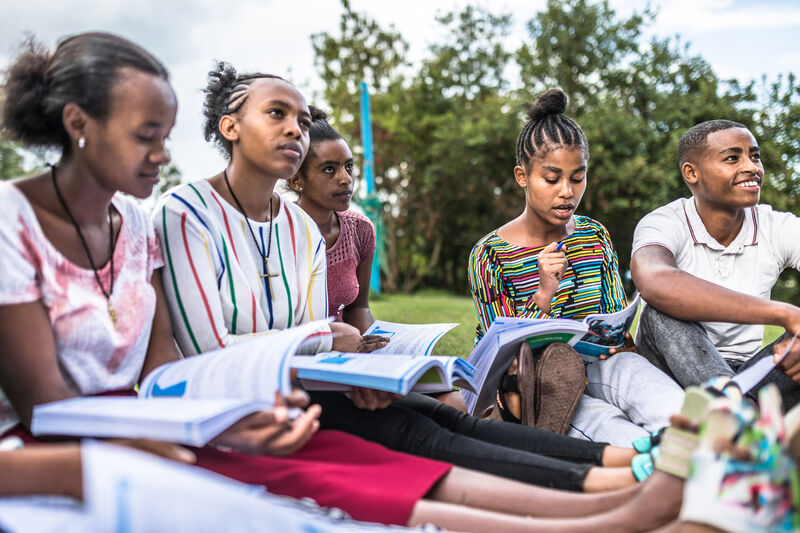YOEP
Youth Organized and Engaged Project (YOEP) Key activities
Read more
Deutsche Stiftung Weltbevölkerung (DSW) is one of the few German organisations that promotes the right to family planning in development cooperation. In particular, we support young people in East Africa to make self-determined decisions about their sexuality and contraception.
We have chosen a selection of our projects to give you an insight into our work in the East African countries of Ethiopia, Kenya, Tanzania and Uganda. This page will be updated regularly.
What sets our initiatives apart
Sub-Saharan Africa has the youngest population in the world – almost one in two people is under the age of 15. This generation of young people holds great potential for the development of their home countries. Through our projects in Ethiopia, Kenya, Tanzania and Uganda, we are committed to providing young people with education and health initiatives that give them the chance of a better future.
In our projects, young people can learn about taboo topics such as sexuality and contraception. For example, they learn how to protect themselves from unintended pregnancy and HIV. A special feature of our work is the principle of “by young people, for young people”. This allows young people to talk openly about sensitive issues. They can also share their experiences and knowledge with each other in a friendly and safe environment.
Through our educational work and our training programmes young people gain the skills to how to earn their own income. In this way, we help them to stand on their own two feet and escape poverty. We also involve parents, teachers, political and religious leaders, and communities in our project work to achieve the greatest and most sustainable impact.
What sets our initiatives apart
The principle of ‘helping people to help themselves’ is central to development cooperation because it promotes long-term, sustainable change. Rather than offering short-term solutions, this principle focuses on strengthening the skills and resources of local communities. By empowering people to solve their own problems and improve their lives, sustainable development becomes possible. This approach promotes personal responsibility, independence and the development of skills within communities, leading to a sustainable and lasting improvement in the quality of life, without creating permanent dependency on external assistance. It is also central to put young people and their needs and aspirations at the centre, without ignoring their environment.
Collecting and analysing data is a key part of our project work. Many of our projects are evaluated by external experts – as required by donors – or we commission studies ourselves. We also use a web-based database in which we systematically record and analyse our impact observations and project progress. To do this, we train our teams and peer educators to collect data on the impact of our work. They ask their peers whether education, information and advice has helped them. This data is particularly useful to us because it feeds directly into our project work.
An example
You are currently viewing a placeholder content from Youtube. To access the actual content, click the button below. Please note that doing so will share data with third-party providers.
More InformationAge-appropriate (and discreet) health care for young people is the goal of the Youth-Friendly Clinics (YFC), which began as a pilot project in Asela in 2022 and has since expanded to five clinics. Young patients do not have to sit with adults in a waiting room where they might meet friends or relatives. This is often a problem when it comes to topic of sex and sexual and reproductive health in Ethiopia, especially in rural areas where people know each other.
Another challenge is the vast distances involved. The youth-friendly clinics are addressing this issue with “flying nurses”, who provide family planning services in remote communities. One of them is 23-year-old Makeya. “DSW trained me,” she says, “and now I can use this knowledge to help the girls and young women who need it most.” But it is not always easy: “Most of the time we rely on vehicles, but sometimes we have to walk to reach remote communities,” Makeya says. Their patients are all the more grateful for this. Makeya now hopes to expand: “We want to reach more people and give them the basic contraceptive services they deserve,” she says. The five clinics are located in the Amhara, Oromia and SNNP regions. They work closely with local health authorities and centres. DSW aims to improve access, quality and utilisation of health services for young people, especially women and girls aged 15-29. Staff from the Ministry of Health have also been brought on board to promote the YFC. The youth-friendly information will also be translated into local languages.
The world is young. About 42 per cent of the world’s 8 billion people are children, adolescents and young adults up to the age of 24. Their share of the population is particularly high in developing countries. In Europe, around 27 percent of the population is under the age of 24; in Africa, the figure is more than twice as high at 60 percent. Young people can be the key to development, especially in the poorer regions of the world. However, this requires that girls and boys have access to good health care, education and work, know their (basic) rights and are able to plan their own families. For over 30 years, we have therefore been carrying out educational work in East Africa and campaigning at political level in Germany and the EU to ensure that sustainable population development is on the international political agenda.